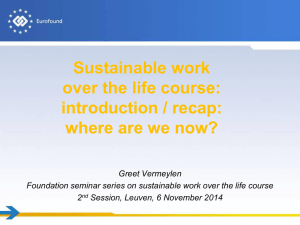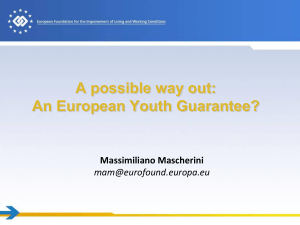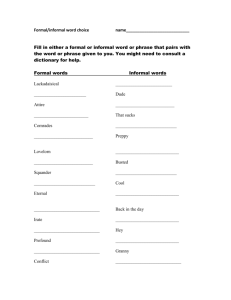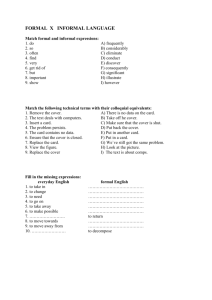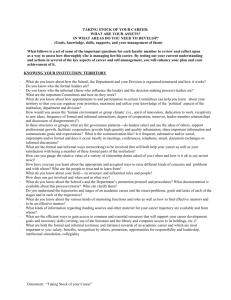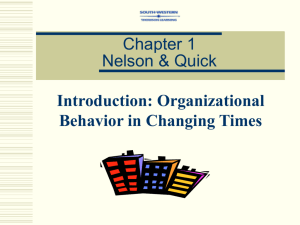informal arrears
advertisement
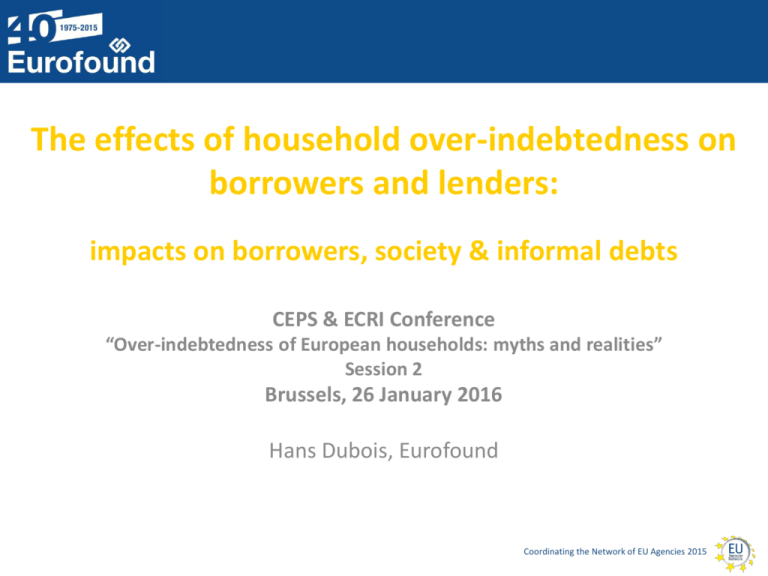
The effects of household over-indebtedness on borrowers and lenders: impacts on borrowers, society & informal debts CEPS & ECRI Conference “Over-indebtedness of European households: myths and realities” Session 2 Brussels, 26 January 2016 Hans Dubois, Eurofound Coordinating the Network of EU Agencies 2015 Impacts: note • Heterogeneity – causes – characteristics of households – impacts on households • But clusters of groups with similar problems, for example: – low income, making ends meet, small expensive debts (consumer/phone/utility) – gradual over-commitment, multiple loans • inadequate financial management, escalating consumption habits, insufficient limitations borrowing – income or expenditure shock due to risky ‘life event’ • unemployment, divorce, business failure, illness, unexpected home repairs • crisis: ‘new to need’, job loss, own mortgaged home, young & welleducated * European Quality of Life Survey (EQLS) will probably ask in 2016 for the 1st time about arrears (because people cannot afford to pay) in “Telephone, mobile or internet connection bills”, along with the usual items. Coordinating the Network of EU Agencies 2015 Consequences of over-indebtedness for quality of life & society • Possible, inter-related consequences (also with causes) of overindebtedness, identified in the literature: – financial hardship, reduced living standards, deprivation of basic goods (also for children) – a strain on social relations – family stress (tensions, separation/divorce - children) – feeling of insecurity – poor health (mental & physical) – problems accessing healthcare (e.g. because support designed for low-income, not adjusted for ‘new’ situation of over-indebtedness*) – stigma – absenteeism at work and lack of organisational commitment – work accidents and industrial disease – barriers to obtaining employment – disconnection, repossession, homelessness – exclusion from basic financial services – difficulties borrowing in future Source: Eurofound (2010) Managing household debts: Social service provision in the EU, http://www.eurofound.europa.eu/pubdocs/2010/70/en/2/EF1070EN.pdf * Eurofound (2014) Access to healthcare in times of crisis, Coordinating the Network of EU Agencies 2015 http://www.eurofound.europa.eu/sites/default/files/ef_publication/field_ef_document/ef1442en.pdf Consequences of over-indebtedness for quality of life & society • In any case negative impact on quality of life – policy objective - ‘beyond GDP’ agenda • May start as purely financial issue, but usually it is not, or quickly converts in a multi-facetted issue – important in order to know what to do, but also additional reason ‘why’… • Negative impact for society – financial cost • public services • public benefits • lost production – social cohesion – trust in government – trust in financial institutions Source: Eurofound (2012) Household debt advisory services in the European Union, http://www.eurofound.europa.eu/publications/htmlfiles/ef1189.htm Coordinating the Network of EU Agencies 2015 From whom would you get support if you needed to urgently raise [500/1,000€] to face an emergency? 82%: member of your family / relative or a friend, neighbour, or someone else, who does not belong to your family or relatives 8%: service provider, institution or organisation 10%: nobody Note: - some may be gifts, but others loans - informal debts should not be over-emphasised, but highlighted because currently often ignored; - we do not know size (maybe relatively small, in particular for low-income groups) Coordinating the Network of EU Agencies 2015 Eurofound (2013) Informal debts, http://www.eurofound.europa.eu/pubdocs/2013/73/en/2/EF1373EN.pdf Advantages of informal loans • Cheaper and more accessible than often expensive alternatives, in particular for poor households • Can solve quickly emerging over-indebtedness • Important financial help and a sign of support • But there are risks! Coordinating the Network of EU Agencies 2015 Eurofound (2013) Informal debts, http://www.eurofound.europa.eu/pubdocs/2013/73/en/2/EF1373EN.pdf Focus: informal arrears Has your household been in arrears at any time during the past 12 months, that is, unable to pay as scheduled… …payments related to informal loans from friends or relatives not living in your household Coordinating the Network of EU Agencies 2015 Eurofound (2013) Informal debts, http://www.eurofound.europa.eu/pubdocs/2013/73/en/2/EF1373EN.pdf Coordinating the Network of EU Agencies 2015 Eurofound (2012) EQLS overview, http://www.eurofound.europa.eu/pubdocs/2012/64/en/1/EF1264EN.pdf Informal debts need to be considered 1. Delayed detection of debt problems • Payment problems come later to the surface – Delayed need to contact formal services – Delayed default: early-warning systems complicated • Financial support by friends or family may not address sources of problems 2. Domino effect of defaults • When friends need the money back (e.g. unemployment), defaults may trigger defaults Coordinating the Network of EU Agencies 2015 Eurofound (2013) Informal debts, http://www.eurofound.europa.eu/pubdocs/2013/73/en/2/EF1373EN.pdf 3. Solutions less effective • Debt restructuring leaves people with informal debts 4. Endangering social networks • Social support important when people are struggling financially*. At risk when can’t pay back informal debts. Coordinating the Network of EU Agencies 2015 * Eurofound (2012) Household debt advisory services in the European Union, http://www.eurofound.europa.eu/publications/htmlfiles/ef1189.htm Social exclusion when support is needed, in particular for low incomes Who would support you if you urgently need money, according to income half & informal arrears (EU28, 2011) 25% 20% 20% 15% 12% Informal arrears 9% 10% 9% 7% 6% 6% 7% No informal arrears 5% 0% Service provider Nobody Bottom 50% income Service provider Nobody Top 50% income Coordinating the Network of EU Agencies 2015 Eurofound (2013) Informal debts, http://www.eurofound.europa.eu/pubdocs/2013/73/en/2/EF1373EN.pdf Low trust in local government, which often provides needed services Trust in local government, according to ability making ends meet & informal arrears (EU28, 2011) 6 5.8 5.4 5.4 5.2 5.0 5 4.6 4.6 Informal arrears No informal arrears 3.9 4 3 Easily or very easily Fairly easy With some difficulty With difficulty or great difficult Coordinating the Network of EU Agencies 2015 Eurofound (2013) Informal debts, http://www.eurofound.europa.eu/pubdocs/2013/73/en/2/EF1373EN.pdf Thank you Hans Dubois Hans.Dubois@eurofound.europa.eu Coordinating the Network of EU Agencies 2015
